八年级上册英语动词的运用
(完整版)人教版英语八年级上册Unit5动词不定式语法详解
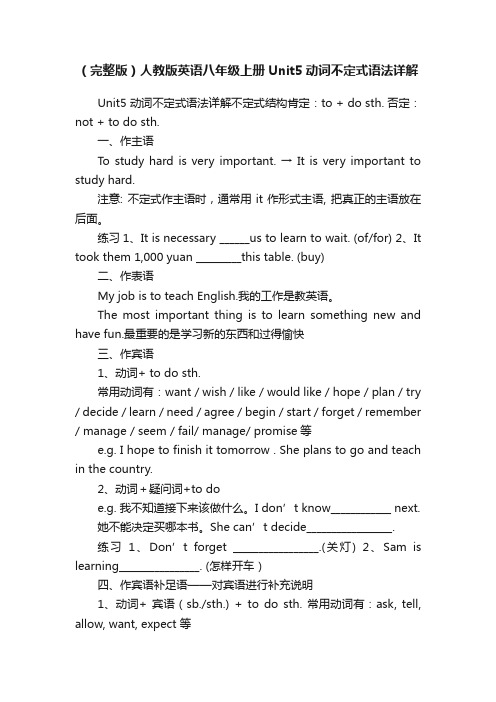
(完整版)人教版英语八年级上册Unit5动词不定式语法详解Unit5 动词不定式语法详解不定式结构肯定:to + do sth. 否定:not + to do sth.一、作主语To study hard is very important. → It is very important to study hard.注意: 不定式作主语时,通常用it作形式主语, 把真正的主语放在后面。
练习1、It is necessary ______us to learn to wait. (of/for) 2、It took them 1,000 yuan _________this table. (buy)二、作表语My job is to teach English.我的工作是教英语。
The most important thing is to learn something new and have fun.最重要的是学习新的东西和过得愉快三、作宾语1、动词+ to do sth.常用动词有:want / wish / like / would like / hope / plan / try / decide / learn / need / agree / begin / start / forget / remember / manage / seem / fail/ manage/ promise等e.g. I hope to finish it tomorrow . She plans to go and teach in the country.2、动词+疑问词+to doe.g. 我不知道接下来该做什么。
I don’t know____________ next.她不能决定买哪本书。
She can’t decide_________________.练习1、Don’t forget _________________.(关灯) 2、Sam is learning________________. (怎样开车)四、作宾语补足语——对宾语进行补充说明1、动词+ 宾语(sb./sth.) + to do sth. 常用动词有:ask, tell, allow, want, expect 等e.g. The teacher asked her to answer the question. The doctor told me to have a good rest.2、动词+宾语+不带to的不定式, 动词多为感官动词、使动词。
八年级上册英语语法笔记
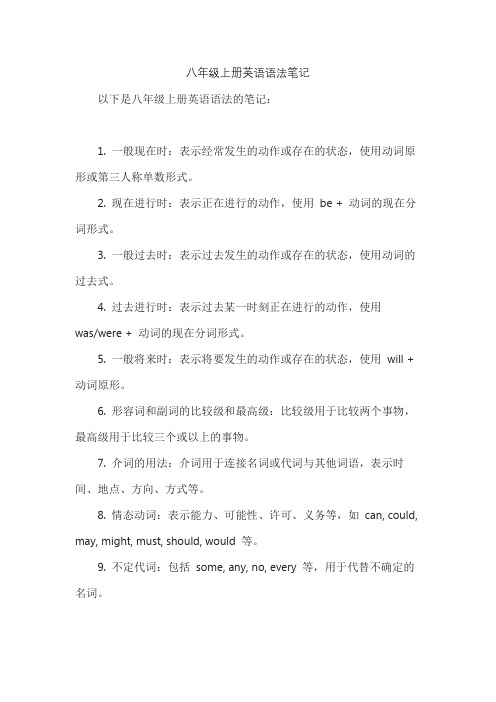
八年级上册英语语法笔记
以下是八年级上册英语语法的笔记:
1. 一般现在时:表示经常发生的动作或存在的状态,使用动词原形或第三人称单数形式。
2. 现在进行时:表示正在进行的动作,使用be + 动词的现在分词形式。
3. 一般过去时:表示过去发生的动作或存在的状态,使用动词的过去式。
4. 过去进行时:表示过去某一时刻正在进行的动作,使用
was/were + 动词的现在分词形式。
5. 一般将来时:表示将要发生的动作或存在的状态,使用will + 动词原形。
6. 形容词和副词的比较级和最高级:比较级用于比较两个事物,最高级用于比较三个或以上的事物。
7. 介词的用法:介词用于连接名词或代词与其他词语,表示时间、地点、方向、方式等。
8. 情态动词:表示能力、可能性、许可、义务等,如can, could, may, might, must, should, would 等。
9. 不定代词:包括some, any, no, every 等,用于代替不确定的名词。
10. 反身代词:用于指代动作的执行者,如myself, yourself, himself, herself, itself, ourselves, yourselves, themselves。
牛津译林版八年级英语上册动词不定式的用法

动词不定式的用法一,动词不定式作宾语1. 概述:动词不定式是动词的非谓语形式之一,其表现形式为:to+动词原形。
其中to是动词不定式符号,没有任何词义。
其否定形式是在to前面加not。
动词不定式有动词的特点,可以有自己的状语;若不定式动词是及物的,可以带自己的宾语.一起构成动词不定式短语。
2. 用法:动词不定式没有人称和数的变化,它具有名词、形容词和副词的特征,同时也保留了动词的某些特征,在句中可充当主语、表语、宾语、宾语补足语、定语以及目的状语等。
本单元介绍动词不定式作宾语的用法。
(1)常见的能带动词不定式作宾语的动词有:want,like,love,wish,hope,need,try,ask,seem,help,learn,decide,plan,start,begin,forget,remember,choose ,prepare,agree 等。
e.g: ① Kate wants to be a doctor when she grows up.② He decided to buy a new MP4.③ We all hope to go to Taizhou next month.④ I don’t like to be late for school.⑤I forgot to bring the MP4 hem.(2)有些动词后面接复合宾语时,常用it作形式宾语,而真正的宾语则由动词不定式来担当,并位于宾语补足语之后。
常见的这样的动词有find,think,feel,make等。
e.g: ① I find it interesting to play computer games我发现玩电脑游戏很有趣。
② We all think it very difficult to finish the work in an hour.3.“疑问词+不定式”结构疑问词who,what,which,when,where和how后接动词不定式可在句中作宾语、主语、表语。
八年级上册英语语法重点:情态动词

八年级上册英语语法重点:情态动词
情态动词
can(能,会), may(可以,可能,也许),must(必须,一定,应该) have to(必须,不得不)
1. 肯定句结构:主语+can/may/must+动词原形+其它,例如:
I must go now.
2. 否定句结构: 在can/may/must后加not,例如:
You mustn’t talk aloud in the library.
3. 一般疑问句结构: 把can/may/must提在主语前,例如:
Must you go now? (Yes, I must. No, I needn’t.)
May I open the window? (Yes, you may. No, you needn’t.)
had better用法
had better+动词原形表示“最好做……”,变否定句时在had better后加not。
例如:
You had better catch a bus.
You’d better not catch a bus. (You had= You’d )
特殊疑问句的变换
对划线部分提问时,将划线部分去掉,剩下部分变一般疑问句语序。
(对主语提问例外)例如:
My name is Lily. What’s your name?
The river is 500 kilometres. Hong long is the river?。
八年级上册英语语法《情态动词should》知识点整理

情态动词should“应该”
一、should的用法
1、should作为情态动词用,常常表示意外、惊奇、不能理解等,有“竟会”的意思,例如:
How should I know? 我怎么知道?
Why should you be so late today? 你今天为什么来得这么晚?
2、should有时表示应当做或发生的事,例如:
We should help each other.我们应当互相帮助。
二、我们在使用时要注意以下几点:
1. 用于表示“应该”或“不应该”的概念。
常指长辈教导或责备晚辈。
例如:
You should be here with clean hands. 你应该把手洗干净了再来。
2.用于提出意见劝导别人。
例如:
You should go to the doctor if you feel ill. 如果感觉不舒服,你最好去看医生。
3. 用于表示可能性。
should的这一用法是考试中常常出现的考点之一。
例如:
We should arrive by supper time. 我们在晚饭前就能到了。
She should be here any moment. 她随时都可能来。
本文由索罗学院整理。
八年级上册英语半期知识点
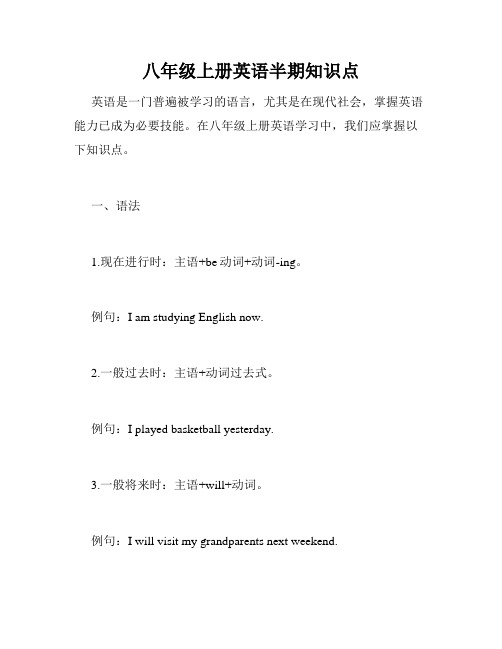
八年级上册英语半期知识点英语是一门普遍被学习的语言,尤其是在现代社会,掌握英语能力已成为必要技能。
在八年级上册英语学习中,我们应掌握以下知识点。
一、语法1.现在进行时:主语+be动词+动词-ing。
例句:I am studying English now.2.一般过去时:主语+动词过去式。
例句:I played basketball yesterday.3.一般将来时:主语+will+动词。
例句:I will visit my grandparents next weekend.4.被动语态:be动词+动词过去分词。
例句:The book was written by him.5.情态动词:can,could,may,might,should,shall,must,need。
例句:We should go to school on time.6.名词性从句:由连接词引导的从句,在从句中充当名词。
例句:What he says is true.二、词汇和短语1.数字:0-1000。
2.颜色、季节、天气等常用词汇。
3.国家、城市、人民等词汇。
4.常见交通工具名称。
5.表示时间的词汇和表达方式,如at,on,in等。
6.表示位置和方向的单词和短语,如in front of,on the left等。
7.表示观点和看法的词汇和短语,如think,believe,in my opinion等。
三、阅读和口语1.能够理解英语短文,并能回答问题。
2.能够使用英语表达自己的日常活动和经历。
3.能够与他人用英语交流,询问并说明问题。
4.能够用英语表述自己的理解和观点。
四、写作1.能够书写简短的英语文章,如便条、日记等。
2.能够用英语描述人物、事物、地点等。
3.能够写出自我介绍、邀请信等简单文章。
以上就是八年级上册英语半期知识点的总结,希望对大家的英语学习有所帮助。
在学习中,要多加练习,不断提高自己的英语能力。
人教版丨八年级上册英语第11单元知识点:常见情态动词的用法
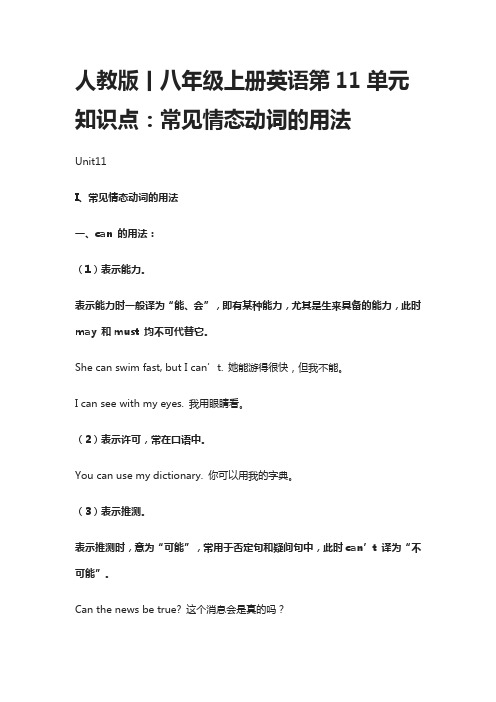
人教版丨八年级上册英语第11单元知识点:常见情态动词的用法Unit11I、常见情态动词的用法一、can 的用法:(1)表示能力。
表示能力时一般译为“能、会”,即有某种能力,尤其是生来具备的能力,此时may 和must 均不可代替它。
She can swim fast, but I can’t. 她能游得很快,但我不能。
I can see with my eyes. 我用眼睛看。
(2)表示许可,常在口语中。
You can use my dictionary. 你可以用我的字典。
(3)表示推测。
表示推测时,意为“可能”,常用于否定句和疑问句中,此时can’t 译为“不可能”。
Can the news be true? 这个消息会是真的吗?—Can it be our teacher? 那个人有可能是我们老师吗?—No, it can’t be our teacher. He is on a visit to the Great Wall.不可能。
咱们老师正在游览长城呢。
二、could的用法:(1)can的过去式,意为“能、会”,表示过去的能力。
He could write poems when he was 10、他十岁时就会写诗。
(2)could在疑问句中,表示委婉的语气,没有过去式的意思。
Could you do me a favour? 你能帮我个忙吗?—Could I use your pen? 我能用一下你的钢笔吗?—Yes, you can. 可以。
三、may的用法:(1)表示请求、许可,比can 正式。
May I borrow your bike? 我可以借你的自行车吗?You may go home now. 现在你可以回家了。
(2)表示推测,谈论可能性,意为“可能,或许”,一般用于肯定句中。
It may rain tomorrow. 明天可能会下雨。
She may be at home. 她可能在家呢.(3)may的过去式为might,表示推测时,可能性低于may。
人教版英语八年级上册08动词不定式(基础讲解)

动词不定式【概念引入】1. 动词不定式名言:(1)动词不定式作表语To lose is to learn. 失败就是学习。
(2)动词不定式作主语It is better to give than to take. 给予比接受更好。
(3)不定式作宾语Expect to be treated as you have treated others.你怎样待别人,就指望别人怎样待你。
(4)不定式作宾补Adversity causes some men to break,others to break records.逆境使一些人崩溃,也使一些人破记录。
(5)不定式作定语There is a time to talk and a time to act.该说的时候说,该做的时候做。
(6)不定式作目的状语To find the exact answer,one must first ask the exact question.要找到确切的答案,首先必须提出确切的问题。
2. 动词不定式定义:动词不定式是一种非谓语形式(不能作谓语),基本形式是to do形式(to是不定式符号的标志,无意义,可以不翻译)肯定式:to + 动词原形否定式:not to + 动词原形【用法讲解】1.动词不定式的特征动词不定动式是一种非谓语动词形式,它没有人称和数的变化,在句子中不能作谓语,但可以作除谓语之外的其它任何句子成分(主语、表语、宾语、宾语补足语、定语和状语);动词不定式具有名词、形容词和副词的特征,同时还保持动词的某些特点,既可以有自己的宾语和状语,动词不定式和它的宾语和状语构成不定式短语。
2. 动词不定式在句子中的作用动词不定式是由to+动词原形构成,在句中起名词,形容词和副词的作用,可以担任除谓语以外的其它任何成分。
(1)动词不定式作主语。
例如:To master a language is not an easy thing.掌握一门语言不是一件容易的事情。
八年级上册英语语法《情态动词can与could的用法》知识点

can与could的用法一、表示能力(1) 表示现在的能力,用can:My sister can drive. 我妹妹会开车。
Everyone here can speak English. 这儿人人会说英语。
(2) 表示将来的能力,通常不用can或could,而用be able to的将来时态:I’ll be able to speak French in another few months. 再过几个月我就会讲法语了。
One day people will be able to go to the moon on holiday. 总有一天人们可以到月球上去度假。
但是,若表示现在决定将来是否有能力做某事,则可用can:Can you come to the party tomorrow? 你明天能来参加我们的聚会吗?(3) 表示过去的能力,有时可用could,有时不能用could,具体应注意以下几点:①若表示过去一般的能力(即想做某事就随时可做某事的能力),可用could:Could you speak English then? 那时候你会说英语吗?②若表示过去的特定能力(即在过去特定场合做某事的能力),则不能用could,而用was (were) able to do sth,或用managed to do sth,或用succeeded in doing sth 等。
He studied hard and was able to pass the exam. 他学习很努力,所以考试能及格。
At last he succeeded in solving the problem. 他终于把那个问题解决了。
【注】could 不用来表示过去特定能力通常只限于肯定句,否定句或疑问句中,它则可以表示过去特定的能力:I managed to find the street, but I couldn’t find her house. 我想法找到了那条街,但没找到她的房子。
八年级英语上册动词过去式

八年级英语上册动词过去式1. 什么是动词过去式?动词过去式是表示过去时态的一种形式。
在英语中,动词过去式通常是通过在动词的基本形式后加上-ed或-d来构成。
不过,也有一些不规则动词的过去式形式并不遵循这种规则。
2. 构成规则大多数动词的过去式可以通过以下规则来构成:•对于以辅音字母加-y结尾的动词,将y变为i,并添加-ed。
例如:study → studied•对于以辅音字母结尾的重读闭音节的动词,双写最后一个辅音字母,并添加-ed。
例如:stop → stopped•对于以不发音的-e结尾的动词,直接添加-d。
例如:love → loved•对于其它动词,直接添加-ed。
例如:live → lived需要注意的是,有一些单词无法通过上述规则来构成过去式,它们属于不规则动词。
我们需要记住这些不规则动词的过去式形式。
3. 不规则动词的过去式下面是一些常见的不规则动词的过去式形式:•be → was / were•have → had•do → did•go → went•come → came•take → took•see → saw•eat → ate•run → ran•give → gave当我们使用这些动词时,需要记住它们的过去式形式。
4. 动词过去式的用法动词过去式一般用于以下情况:•描述过去发生的动作。
例如:I watched a movie last night.•描述过去的习惯或状态。
例如:She always ate breakfast before going to school.在使用动词过去式时,我们需要注意动作发生的时间。
过去式表示的是已经发生的动作,与当前时间不一致。
5. 动词过去式的练习为了更好地掌握动词过去式,我们可以进行一些练习。
•练习1:将以下动词变为过去式:–play → played–study → studied–stop → stopped–love → loved–live → lived–go → went–come → came–take → took–see → saw–eat → ate•练习2:根据句子的上下文,填写正确的动词过去式形式:–We ___ (watch) a movie last night.–She ___ (eat) breakfast before going to school.–He ___ (run) in the park yesterday.–They ___ (give) me a gift for my birthday.通过这些练习,我们可以更好地应用动词过去式。
八年级上册英语重点句型归纳
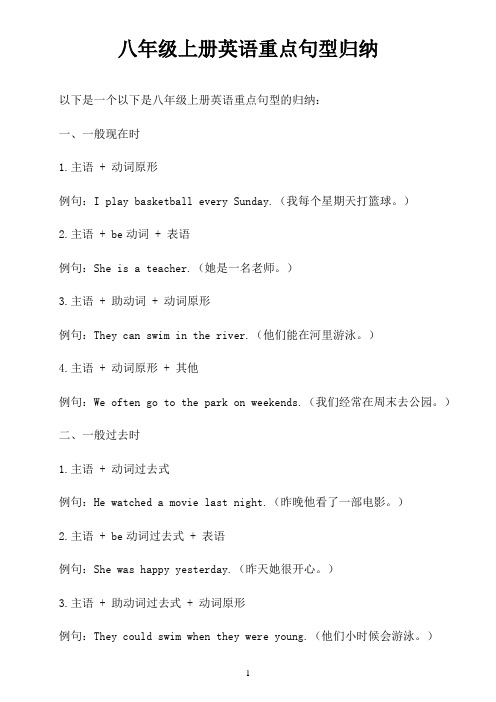
八年级上册英语重点句型归纳以下是一个以下是八年级上册英语重点句型的归纳:一、一般现在时1.主语 + 动词原形例句:I play basketball every Sunday.(我每个星期天打篮球。
)2.主语 + be动词 + 表语例句:She is a teacher.(她是一名老师。
)3.主语 + 助动词 + 动词原形例句:They can swim in the river.(他们能在河里游泳。
)4.主语 + 动词原形 + 其他例句:We often go to the park on weekends.(我们经常在周末去公园。
)二、一般过去时1.主语 + 动词过去式例句:He watched a movie last night.(昨晚他看了一部电影。
)2.主语 + be动词过去式 + 表语例句:She was happy yesterday.(昨天她很开心。
)3.主语 + 助动词过去式 + 动词原形例句:They could swim when they were young.(他们小时候会游泳。
)4.主语 + did + 动词原形 + 其他例句:We did our homework after school.(放学后我们做作业。
)三、一般将来时1.主语 + will + 动词原形例句:I will visit my grandparents next week.(下周我将去拜访我的祖父母。
)2.主语 + be going to + 动词原形例句:She is going to buy a new dress for the party.(她准备给聚会买一件新裙子。
)3.主语 + 助动词 + 动词原形例句:They are going to play basketball this afternoon.(他们打算今天下午打篮球。
)四、现在进行时1.主语 + am/is/are + 动词-ing例句:I am reading a book now.(我正在看书。
人教版新目标八年级英语上册第一单元语法情态动词的用法及练习
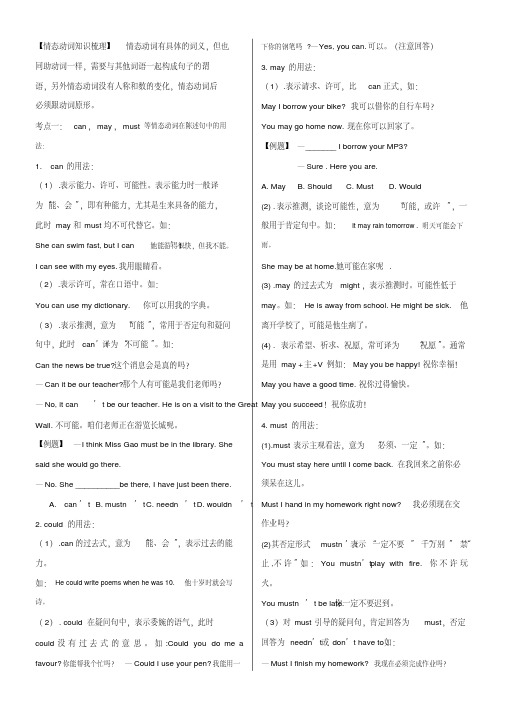
【情态动词知识梳理】情态动词有具体的词义,但也同助动词一样,需要与其他词语一起构成句子的谓语,另外情态动词没有人称和数的变化,情态动词后必须跟动词原形。
考点一:can,may,must等情态动词在陈述句中的用法:1.can的用法:(1).表示能力、许可、可能性。
表示能力时一般译为“能、会”,即有种能力,尤其是生来具备的能力,此时may和must均不可代替它。
如:She can swim fast, but I can’t .她能游得很快,但我不能。
I can see with my eyes.我用眼睛看。
(2).表示许可,常在口语中。
如:You can use my dictionary. 你可以用我的字典。
(3).表示推测,意为“可能”,常用于否定句和疑问句中,此时can’t译为“不可能”。
如:Can the news be true?这个消息会是真的吗?—Can it be our teacher?那个人有可能是我们老师吗?—No, it can’t be our teacher. He is on a visit to the Great Wall.不可能。
咱们老师正在游览长城呢。
【例题】—I think Miss Gao must be in the library. Shesaid she would go there.—No. She __________be there, I have just been there.A.can’tB. mustn’tC. needn’tD. wouldn’t2. could的用法:(1).can的过去式,意为“能、会”,表示过去的能力。
如:He could write poems when he was 10. 他十岁时就会写诗。
(2). could在疑问句中,表示委婉的语气,此时could没有过去式的意思。
如:Could you do me a favour?你能帮我个忙吗?—Could I use your pen?我能用一下你的钢笔吗?—Yes, you can.可以。
八年级英语上册语法知识点归纳总结

八年级英语上册的语法知识点主要包括动词的一般现在时、现在进行时、一般将来时和一般过去时。
以下是这些语法知识点的归纳总结:1. 一般现在时:* 基本用法:表示经常性、习惯性的动作或状态,常与always、often、sometimes等连用。
例如:I usually go to school by bus.* 第三人称单数形式:动词后面加上-s或-es,如He plays basketball every day.* 否定句和疑问句:借助助动词do/does,如Do you speak English? 或Does he like soccer?2. 现在进行时:* 基本用法:表示正在进行的动作或存在的状态,例如:I am studying now.* 结构:be动词(am/is/are)+动词的现在分词,如He is playing soccer.* 疑问句和否定句:借助助动词助动词am/is/are,例如Are they playing basketball? 或 They are not playing basketball.3. 一般将来时:* 基本用法:表示将来要发生的动作或存在的状态,常与will或be going to连用,例如:I will visit my grandparents next week.* 结构:will+动词原形,或者be going to+动词原形,例如They are going to have a party next week.* 疑问句和否定句:借助助动词will或be going to,例如Are they going to watch a movie? 或 They are not going to watch a movie.4. 一般过去时:* 基本用法:表示过去发生的动作或存在的状态,常与last week、yesterday等时间状语连用,例如:I saw a movie yesterday.* 结构:动词过去式的基本形式是加-ed,例如He played soccer yesterday.* 疑问句和否定句:借助助动词did,例如Did they go to the park yesterday? 或 They did not go to the park yesterday.以上是八年级英语上册的主要语法知识点总结。
天津市外研版八年级英语上册动词不定式用法总结及练习附答案

八年级上册动词不定式用法总结及练习M5-6动词不定式即to+动词原形,否定形式是:not to +动词原形。
动词不定式在句中不能作谓语,可以充当其他句子成分。
动词不定式没有人称和数的变化。
同学们在八年级上册书中学习的是动词不定式作宾语、目的状语和宾语补足语的用法。
下面做详细解说:一:动词不定式作宾语。
同学们在学习英语过程中会遇到两个动词连用的情况,比如要表达“想做某事,需要做某事,决定做某事”时,第一个动词往往在句中体现句子的时态,即谓语动词,但是后面的动词该用什么形式呢?这就需要用到动词不定式了。
如:want to do sth. , need to do sth. , decide to do sth. 像want,need,decide等动词后面可以直接加动词不定式,那么这个动词不定式就作前面动词的宾语。
这类动词属于及物动词(就是能够直接加名词代词作宾语的动词),表明想要,计划或希望要做(或发生)的事。
动词不定式所表示的多为将来的行为。
但需要注意的是:在英语学习中并不是所有的动词都采用“动词+不定式”的形式,因为动词不同,对其后的形式要求也不同。
常见的后面接“to +动词原形”作宾语的动词有:plan计划,decide决定,want想要,hope希望,offer提议,learn 学习,promise 承诺,agree同意,等等。
同步练习:(一)用所给动词的正确形式填空1. She said she offered ____ (take) me to the shopping center.2. They decided ____ (play) tennis against Guangming Middle School.3. He wanted _____ (watch) the football match at the stadium.4. My parents plan _____ (visit) my grandparents next weekend.5. David promised ____ (not be)late for school next time.(二)根据短文内容,用所给动词的正确形式填空。
牛津译林版八年级上册(U1-8)全册英语动词固定语法总结及训练
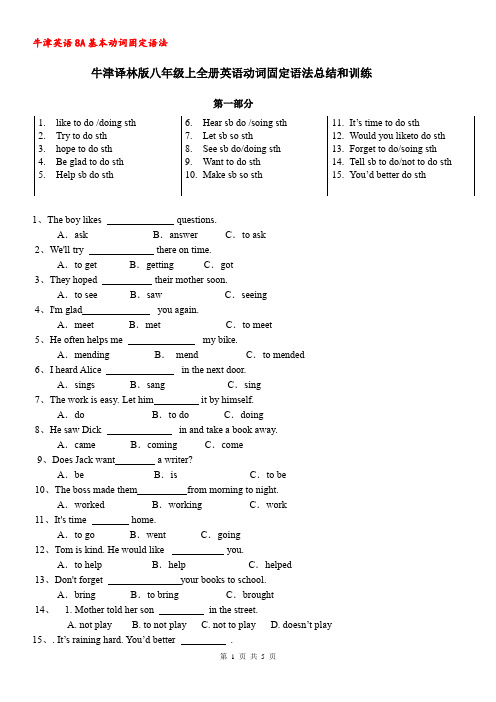
牛津译林版八年级上全册英语动词固定语法总结和训练第一部分1、The boy likes questions.A.ask B.answer C.to ask2、We'll try there on time.A.to get B.getting C.got3、They hoped their mother soon.A.to see B.saw C.seeing4、I'm glad you again.A.meet B.met C.to meet5、He often helps me my bike.A.mending B.mend C.to mended6、I heard Alice in the next door.A.sings B.sang C.sing7、The work is easy. Let him it by himself.A.do B.to do C.doing8、He saw Dick in and take a book away.A.came B.coming C.come9、Does Jack want a writer?A.be B.is C.to be10、The boss made them from morning to night.A.worked B.working C.work11、It's time home.A.to go B.went C.going12、Tom is kind. He would like you.A.to help B.help C.helped13、Don't forget your books to school.A.bring B.to bring C.brought14、 1. Mother told her son in the street.A. not playB. to not playC. not to playD. doesn’t play15、. It’s raining hard. You’d better .A. go outB. not go outC. not to go outD. to not out第二部分1.、I'll remember her the letter.A.give B.gave C.to give2.、He turned on the radio and stopped to the radio.A.listened B.to listen C.listening3.、He had decided it again.A.written B.writing C.to write4.、It's cold. You need warm clothes.A.to wear B.wearing C.wore5.、Mr Black will agree there with you.A.to go B.went C.will go6.、They were able to last year.A.swam B.swim C.swimming7.、She is pleased her friend.A.to meet B.met C.meeting8.、They were sorry that.A.to hear B.heard C.hearing9.、He is sure tomorrow.A.to come B.will come C.coming10.、Teacher told us quiet.A.is B.are C.to be11.、He will teach me this year.A.to skate B.skating C.skated12.、They asked him any noise.A.not making B.no make C.not to make13.、Did you hear her the song in English last night?A.sing B.sang C.to sing D.sings 14.、The students don't know next.A.to do what B.what to doC.what do D.do what15.、The boss made them ten hours a day.A.worked B.working C.work D.to work第三部分1.、I'd like my good friend to my home.A.come B.will come C.coming D.to come 2.、Will you help me this morning?A.do the wash B.to do the washC.do the washing D.doing the washing3.、I'd love that film, will it be on tomorrow?A.see B.to see C.seeing D.seen 4.He told them on with the work.A.to go B.going C.go D.went 5.、We'll try the work before seven o'clock.A.finished B.finish C.to finish D.finishing 6.、It's raining hard. You'd better .A.go out B.not go out C.no to go out D.to not go out 7.、This maths problem is difficult. Let me it over.A.to think B.thinking C.think D.thought8.、Sorry I've kept you for a long time.A wait B.to wait C.waiting D.Waited9.、It's not easy a foreign language.A.learns B.learnC.to learn D.learning10.、I'm hungry. Please give me something .A.eat B.eating C.to eat D.eaten11.、Mr Smith enjoys to light music.Alistens B.to listen C.listening D.listen 12.、It was very late at night he still went on .A.works B.workedC.working D.work13.、When they walked along the river, they suddenly heard somebody for help.A.call B.callingC.called D.to call14.、Stop and listen to me carefully said the teacher.A.to talk B.talking C.talk D.talks15.、The teacher asked me the question in English.A answer.B toanswerC.answered D.answering16.、It was eleven o'clock, she stopped the child from TV.A.watch B.watchingB.C.to watch D.watched17.、He is strong enougn the box.A.carry B.to carryC.carrying D.carries18.、Please be quiet. You talk loudly in the library.A.needn't B.mustn'tC.need D.must19.、Don't be late. You be there on time.A.must B.canC.may D.needn't20.、"I speak to Ann?" "Speaking."A.Must B.May C.Need D.Shall21.I've looked for my pen everywhere, but I find it.A.couldn't B.can'tC.mustn't D.didn't22.、Excuse me ,I ask you a question?A.will B.do C.may D.would23.、"Must I finish my homework now?" "No, you ."A.mustn't B.can't C.needn't D.may not24.、"You must be here at six tomorrow morning.""Sorry I be here so early."A.need B.must C.may D.can't25.、Don't be late. You be there on time.A.must B.can C.may D.needn't26.、We catch up with you. Please speak a little more slowly.A.can B.can't C.may not D.must27.After she finished the letter, she went to bed.A. to writeB. writingC. writtenD. wrote28.It was very late at night, he still went on .A. worksB. workedC. workingD. work29.. I usually forget the door, but I remembered itwhen I left yesterday.A closing, closing B. to close, to closeC. to close, closingD. closing, to close30.Listening! Can you hear a baby ?A. cryB. to cryC. cryingD. cries。
八年级上册英语第一单元句型
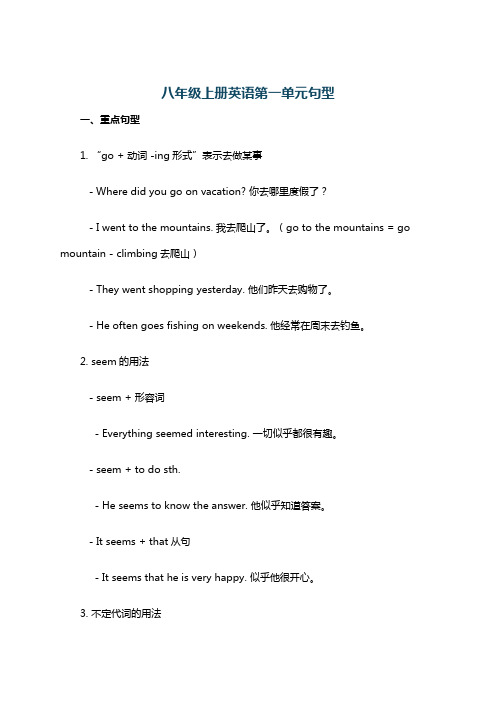
八年级上册英语第一单元句型一、重点句型1. “go + 动词 -ing形式”表示去做某事- Where did you go on vacation? 你去哪里度假了?- I went to the mountains. 我去爬山了。
(go to the mountains = go mountain - climbing去爬山)- They went shopping yesterday. 他们昨天去购物了。
- He often goes fishing on weekends. 他经常在周末去钓鱼。
2. seem的用法- seem + 形容词- Everything seemed interesting. 一切似乎都很有趣。
- seem + to do sth.- He seems to know the answer. 他似乎知道答案。
- It seems + that从句- It seems that he is very happy. 似乎他很开心。
3. 不定代词的用法- 形容词修饰不定代词时,形容词后置。
- Did you buy anything special? 你买了什么特别的东西吗?- There is nothing new in this book. 这本书里没有什么新内容。
- 不定代词作主语时,谓语动词用单数形式。
- Everyone was on vacation. 每个人都在度假。
- Something is wrong with my bike. 我的自行车出毛病了。
4. “decide to do sth.”决定做某事- They decided to go to the beach. 他们决定去海滩。
- She decided to study harder. 她决定更努力学习。
5. “try doing sth.”尝试做某事;“try to do sth.”尽力做某事- He tried climbing the tree. 他尝试爬树。
八年级上册英语18页2d知识点

八年级上册英语18页2d知识点在八年级英语上册的第18页上,学生需要掌握2d知识点,它包括以下内容:一、动词时态动词时态是英语学习中最基本的内容之一,也是非常重要的一部分。
在第18页上,学生需要了解以下有关动词时态的知识点:1. 简单现在时态用法:表示现在正在发生的动作或者状态。
例句:Tom plays football with his friends every weekend.2. 现在进行时态用法:表示现在正在进行的动作。
例句:I am reading a book in the library right now.3. 简单过去时态用法:表示过去发生的动作或者状态。
例句:Last night, I watched a movie with my family.4. 过去进行时态用法:表示过去正在进行的动作。
例句:She was cooking dinner when I walked into the kitchen.5. 将来时态用法:表示将来要发生的动作或者状态。
例句:I will go to the beach next weekend.二、被动语态被动语态也是非常重要的知识点之一。
在第18页上,学生需要了解以下有关被动语态的知识点:1. 被动语态的基本结构是“be + 动词的过去分词”。
例句:The letter was written by John.2. 在被动语态中,重要的是要注意主语和宾语的位置。
例句:Active: He repaired the car. Passive: The car was repaired by him.三、定语从句在英语语法中,定语从句也是一个常见的知识点。
在第18页上,学生需要了解以下有关定语从句的知识点:1. 定语从句用来修饰名词或者代词,通常用who、whom、whose、which、that等作为引导词。
例句:The man who is sitting next to me is my friend.2. 定语从句通常用来给出更多的信息,使得句子更具体、更清楚。
【八年级】八年级英语上册动词的运用
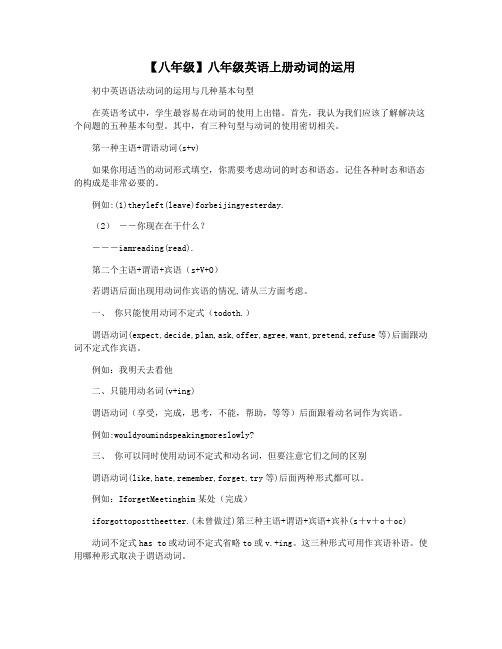
【八年级】八年级英语上册动词的运用初中英语语法动词的运用与几种基本句型在英语考试中,学生最容易在动词的使用上出错。
首先,我认为我们应该了解解决这个问题的五种基本句型。
其中,有三种句型与动词的使用密切相关。
第一种主语+谓语动词(s+v)如果你用适当的动词形式填空,你需要考虑动词的时态和语态。
记住各种时态和语态的构成是非常必要的。
例如:(1)theyleft(leave)forbeijingyesterday.(2)――你现在在干什么?―――iamreading(read).第二个主语+谓语+宾语(s+V+O)若谓语后面出现用动词作宾语的情况,请从三方面考虑。
一、你只能使用动词不定式(todoth.)谓语动词(expect,decide,plan,ask,offer,agree,want,pretend,refuse等)后面跟动词不定式作宾语。
例如:我明天去看他二、只能用动名词(v+ing)谓语动词(享受,完成,思考,不能,帮助,等等)后面跟着动名词作为宾语。
例如:wouldyoumindspeakingmoreslowly?三、你可以同时使用动词不定式和动名词,但要注意它们之间的区别谓语动词(like,hate,remember,forget,try等)后面两种形式都可以。
例如:IforgetMeetinghim某处(完成)iforgottoposttheetter.(未曾做过)第三种主语+谓语+宾语+宾补(s+v+o+oc)动词不定式has to或动词不定式省略to或v.+ing。
这三种形式可用作宾语补语。
使用哪种形式取决于谓语动词。
(1)谓语动词(ask,tell,allow,advise,invite,want,like,expect,order,warn,encourage等)后面用动词不定式有to的形式作宾补。
他其他的想法是让她星期天出去(2)谓语动词keep后面用动词作宾补,只能用v.+ing形式。
八年级上册英语U1常考知识点
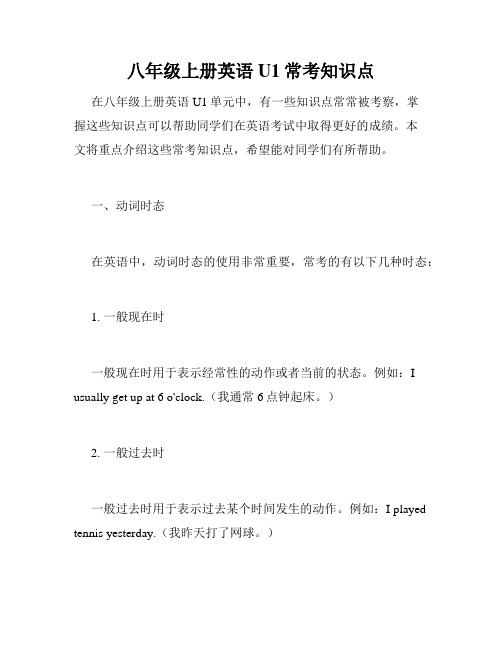
八年级上册英语U1常考知识点在八年级上册英语U1单元中,有一些知识点常常被考察,掌握这些知识点可以帮助同学们在英语考试中取得更好的成绩。
本文将重点介绍这些常考知识点,希望能对同学们有所帮助。
一、动词时态在英语中,动词时态的使用非常重要,常考的有以下几种时态:1. 一般现在时一般现在时用于表示经常性的动作或者当前的状态。
例如:I usually get up at 6 o'clock.(我通常6点钟起床。
)2. 一般过去时一般过去时用于表示过去某个时间发生的动作。
例如:I played tennis yesterday.(我昨天打了网球。
)3. 现在进行时现在进行时用于表示现在正在进行的动作。
例如:She is reading a book now.(她正在读一本书。
)4. 一般将来时一般将来时用于表示将来会发生的动作。
例如:We will have a party next week.(我们下周要开个派对。
)二、代词代词在英语中也非常重要,正确使用代词可以让语言更加流畅。
1. 主格代词主格代词通常用于作主语或者表语。
例如:He is my friend.(他是我的朋友。
)2. 宾格代词宾格代词通常用于作宾语或者介词后面。
例如:I gave him a book.(我给了他一本书。
)3. 形容词性物主代词形容词性物主代词通常用于表示所属关系。
例如:This is my book.(这是我的书。
)4. 名词性物主代词名词性物主代词通常用于作主语或者宾语。
例如:This book is mine.(这本书是我的。
)三、形容词和副词形容词和副词也是常考点之一,正确使用形容词和副词可以增强语言表达的准确性。
1. 形容词的比较级和最高级形容词的比较级和最高级可以用来比较两个或者多个事物的不同之处。
例如:She is taller than me.(她比我高。
)2. 副词的比较级和最高级副词的比较级和最高级可以用来描述动作的方式和程度。
- 1、下载文档前请自行甄别文档内容的完整性,平台不提供额外的编辑、内容补充、找答案等附加服务。
- 2、"仅部分预览"的文档,不可在线预览部分如存在完整性等问题,可反馈申请退款(可完整预览的文档不适用该条件!)。
- 3、如文档侵犯您的权益,请联系客服反馈,我们会尽快为您处理(人工客服工作时间:9:00-18:30)。
初中英语语法动词的运用与几种基本句型
在英语考试中,同学们最容易出错的地方是在动词的运用上。
如何解决这个问题,我认为首先要了解简单句的5种基本句型。
其中3种句型与动词的运用有着密切关系。
第一种主语+谓语动词(S+V)
若用动词的适当形式填空,你需要考虑动词的时态和语态,牢记各种时态和语态
的构成是非常必要的。
例如:(1)They left(leave) for Beijing yesterday.
(2)———What are you doing now?
———I am reading(read).
第二种主语+谓语+宾语(S+V+O)
若谓语后面出现用动词作宾语的情况,请从三方面考虑。
一、只能用动词不定式(to do sth.)
谓语动词(expect,decide,plan,ask,offer,agree,want,pretend,refuse等)后面跟动词不
定式作宾语。
例如:I hope to see him tomorrow.
二、只能用动名词(V+ing)
谓语动词(enjoy,finish,consider,mind,can't,help等)后面跟动名词作宾语。
例如:Would you mind speaking more slowly?
三、既可以用动词不定式也可用动名词,但要注意他们之间的区别
谓语动词(like,hate,remember,forget,try等)后面两种形式都可以。
例如:I forget meeting him somewhere.(曾做过)
I forgot to post the etter.(未曾做过)第三种主语+谓语+宾语+宾补(S+V+O+OC)
动词不定式有to或动词不定式省略to或V.+ing这三种形式都可以作宾补。
用哪一种形式由谓语动词决定。
(1)谓语动词(ask,tell,allow,advise,invite,want,like,expect,order,warn,encourage等)后面用动词不定式有to的形式作宾补。
例如:His mother allow sher to go out on Sunday.
(2)谓语动词keep后面用动词作宾补,只能用v.+ing形式。
例如:I'msorry.I keep you waiting for a longt ime.
(3)谓语动词(watch,see,hear,notice等)后面用动词不定式省略to的形式作宾补。
例如:I watched a man come out of the bank.(强调动作的整个过程时用省略to的动词不定式)
注意此类谓语动词后也可以用V.+ing形式作宾补。
例如:I heard someone knocking gently on the door.(强调动作正在进行时就用
V.+ing形式)
(4)谓语动词(let,make等)后面用动词不定式省略to的形式作宾补(而help后既可加to,也可省略to)。
例如:———Mr.Lee told us ani nteresting story yesterday.
———It made all of us______.
ugh
B.to laugh
ughed
ughing
通过对以上句型的分析,同学们一定会对动词的用法有更进一步的了解。
